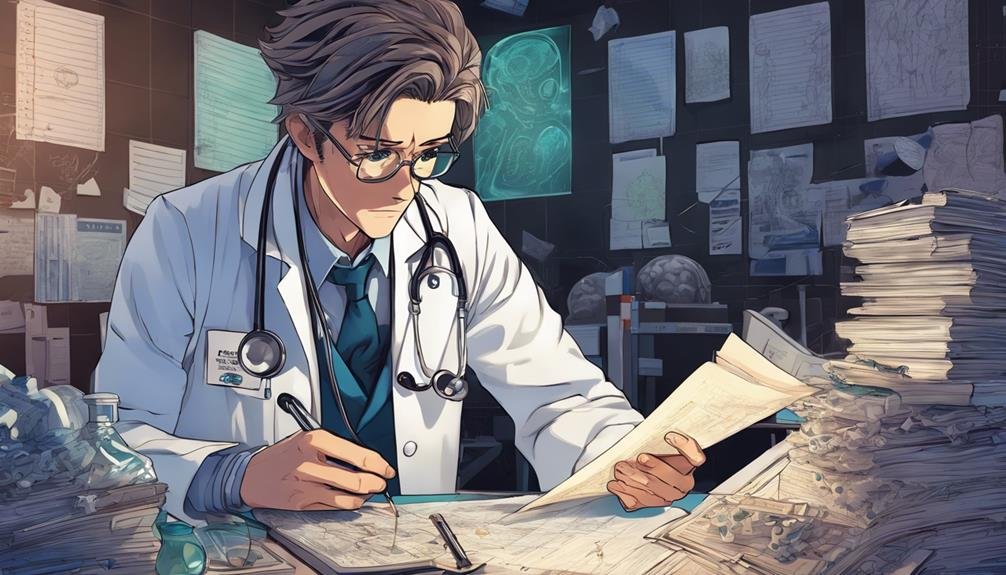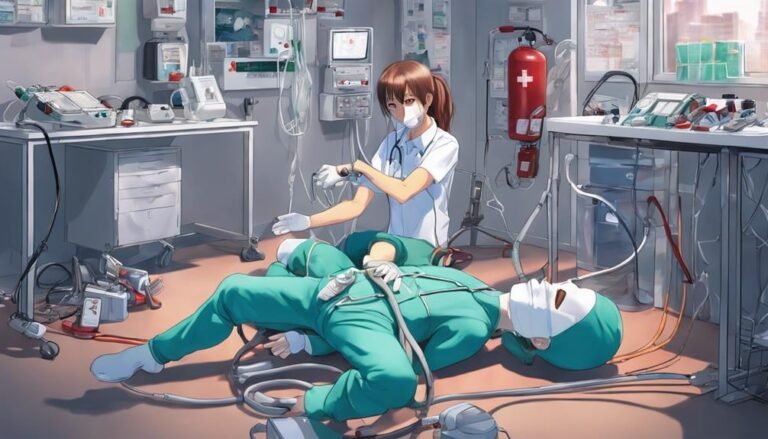How to Be More Insightful in Diagnosing Complex Cases
Have you ever considered that the secret to revealing complex medical cases lies not just in what is presented, but also in what is hidden beneath the surface?
By exploring the depths of patient histories and symptoms, you may unearth essential clues that lead to a more accurate diagnosis.
But this is just the beginning.
Stay tuned to reveal a range of strategies that can elevate your diagnostic skills to a whole new level.
Key Takeaways
- Enhance diagnostic skills through active listening and advanced tools.
- Collaborate effectively with multidisciplinary teams for innovative solutions.
- Utilize advanced diagnostic tools like imaging and genetic testing for precision.
- Embrace a holistic approach considering physical, emotional, and spiritual well-being.
Importance of Comprehensive Patient History
Understanding the significance of obtaining a thorough patient history is foundational to effectively diagnosing complex cases. Interview techniques play a critical role in this process. By employing active listening skills, asking open-ended questions, and utilizing empathy, healthcare providers can gather essential information that might otherwise be overlooked. These interview techniques not only aid in building rapport with the patient but also help in uncovering important details that could be instrumental in reaching an accurate diagnosis.
In addition to interview techniques, red flag assessment is another critical aspect of obtaining a complete patient history. Identifying red flags, such as persistent symptoms, sudden changes in health status, or a family history of certain conditions, can provide valuable insights into potential underlying issues. By paying close attention to these warning signs, healthcare professionals can prioritize certain diagnostic tests or investigations, ultimately leading to more efficient and accurate diagnoses. Mastering the art of red flag assessment, in conjunction with effective interview techniques, is essential for healthcare providers aiming to diagnose complex cases with precision and insight.
Utilizing Advanced Diagnostic Tools
To enhance your diagnostic capabilities further, incorporating advanced diagnostic tools into your practice can greatly augment your ability to pinpoint underlying complexities in challenging cases. Leveraging advanced technology and precision medicine can provide you with invaluable insights and help tailor treatments for individual patients.
Here are three key tools worth exploring:
- Diagnostic Imaging: Utilizing advanced imaging techniques such as MRI, CT scans, or PET scans can offer detailed views of the internal structures, aiding in the identification of abnormalities or anomalies that may not be visible through traditional methods.
- Genetic Testing: Genetic testing can uncover inherited genetic mutations or predispositions to certain conditions, allowing for personalized treatment plans and targeted interventions based on an individual's genetic makeup.
- Advanced Analytical Software: Employing cutting-edge analytical software can help analyze complex data sets, identify patterns, and assist in making more accurate diagnoses, especially in cases where multiple factors need to be taken into account simultaneously.
Collaborating With Multidisciplinary Teams
Consider integrating a multidisciplinary approach into your practice to enhance diagnostic accuracy and treatment efficacy in complex cases. Team dynamics play a vital role in collaborating with multidisciplinary teams. Understanding each team member's role, expertise, and how they contribute to the diagnostic process is essential.
Effective team dynamics involve clear communication, respect for diverse perspectives, and a shared goal of improving patient outcomes. Interdisciplinary communication is key to successful collaboration. It involves sharing information, insights, and observations openly and transparently among team members.
Encouraging regular team meetings, case discussions, and feedback sessions can enhance interdisciplinary communication and foster a supportive environment for all team members. Embracing diverse viewpoints and expertise within the team can lead to more thorough evaluations and innovative treatment approaches.
Embracing a Holistic Approach
Integrating a holistic approach into your diagnostic process can provide a thorough understanding of intricate cases, enhancing the effectiveness of your treatment strategies. When you embrace a holistic approach, you consider all aspects of an individual's health, not just the presenting symptoms.
Here are three key elements to focus on:
- Integrative Medicine: Explore the benefits of combining traditional medicine with complementary and alternative therapies to address the physical, emotional, and spiritual aspects of a patient's well-being.
- Mind-Body Connection: Acknowledge the interplay between mental and physical health, understanding how thoughts, emotions, and stress can impact the body's physiological processes.
- Preventive Care: Shift your focus from solely treating existing conditions to also emphasizing proactive measures that can help prevent illnesses and promote overall wellness.
Enhancing Clinical Observation Skills
Enhance your clinical observation skills by keenly observing subtle cues and patterns during patient interactions. Visual perception plays a critical role in this process as it allows you to notice non-verbal communication, body language, skin color changes, or physical symptoms that might indicate underlying health issues. By sharpening your visual perception, you can gather valuable information that contributes to a more accurate diagnosis.
Critical thinking is equally vital when enhancing clinical observation skills. It involves analyzing the information you gather, considering different possibilities, and forming logical conclusions based on evidence. When observing patients, critically evaluating the significance of the observed cues can help you connect the dots and uncover hidden aspects of their condition. This analytical approach enables you to make informed decisions and provide better care for your patients.
Incorporating Evidence-Based Practices
Incorporating evidence-based practices into your diagnostic approach guarantees that your decisions are grounded in proven research and clinical data, leading to more effective patient care. When it comes to integrating evidence-based practices, consider the following:
- Research Integration: Stay updated on the latest research findings and incorporate relevant studies into your diagnostic process to make certain you're utilizing the most current information available.
- Data Analysis: Utilize data-driven approaches to analyze patient information systematically. This will help you identify patterns, correlations, and potential causes of the patient's condition more accurately.
- Case Studies and Critical Thinking: Engage with case studies to deepen your understanding of complex cases and hone your critical thinking skills. Analyzing different scenarios will enhance your ability to make informed decisions based on evidence and logic.
Continuous Professional Development
To enhance your diagnostic skills and keep up with the latest advancements, it's vital to stay updated with current research findings.
Attending relevant workshops will provide you with practical insights and opportunities to expand your knowledge base.
Seeking mentorship opportunities can offer guidance and support in maneuvering complex cases, ultimately contributing to your continuous professional development.
Stay Updated With Research
Staying current with research is essential for professionals aiming to enhance their diagnostic abilities in handling complex cases. To effectively integrate research into your practice and expand your knowledge, consider the following:
- Regularly Review Journals: Stay updated on the latest studies and findings in your field to broaden your understanding and stay informed about new developments.
- Engage in Online Forums: Participate in discussions and share insights with colleagues to exchange perspectives and gain new insights into different approaches and methodologies.
- Follow Key Researchers: Keep track of influential researchers in your area of expertise to access their latest publications and stay ahead of emerging trends.
Attend Relevant Workshops
Reviewing the latest studies and findings is valuable, but to truly enhance your diagnostic skills in handling complex cases, attending relevant workshops for continuous professional development is essential. Workshops offer hands-on simulations and interactive learning experiences that can greatly improve your ability to analyze and diagnose intricate cases. By engaging in practical case studies and real-life scenarios during these workshops, you can sharpen your critical thinking skills and gain valuable insights into different approaches to diagnosis. The interactive nature of workshops allows you to apply theoretical knowledge to practical situations, honing your problem-solving abilities in a supportive environment. Investing time in attending these workshops can have a profound impact on your diagnostic proficiency and overall effectiveness in managing complex cases.
| Benefits of Workshops | Examples of Activities |
|---|---|
| Hands-on simulations | Role-playing exercises |
| Interactive learning | Group discussions |
Seek Mentorship Opportunities
Enhance your diagnostic proficiency and professional growth by actively seeking mentorship opportunities as part of your continuous professional development. Mentorship offers invaluable insights and guidance that can greatly enhance your ability to diagnose complex cases.
Here are some key benefits of seeking mentorship:
- Peer Support: Engaging with peers who've diverse experiences can provide fresh perspectives and collaborative problem-solving approaches.
- Learning from Experts: Mentors with extensive experience can share their knowledge, best practices, and strategies for maneuvering through challenging diagnostic situations.
- Personalized Feedback: Direct feedback from mentors can help you identify areas for improvement and refine your diagnostic skills more effectively.
Conclusion
Congratulations, you're now a diagnostic wizard!
With your newfound skills in patient history, advanced tools, teamwork, holistic thinking, keen observation, and evidence-based practices, you're like a medical Sherlock Holmes.
Keep honing your craft through continuous learning and watch as complex cases unravel before your eyes.
You're not just a doctor, you're a detective of the medical world.
Keep solving those mysteries!







